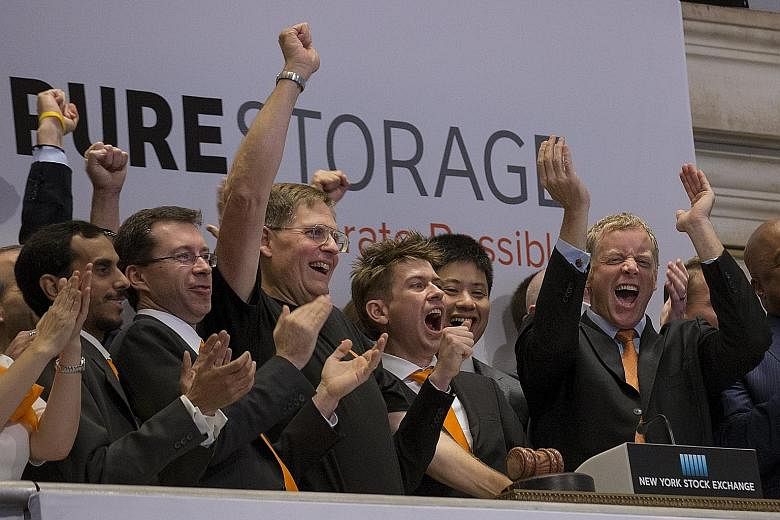SAN FRANCISCO • Last year, many initial public offerings (IPOs) in the technology sector saw soaring valuations at their Wall Street debuts, raining cash on the firms and their investors, and raising fears of another Silicon Valley bubble.
Now, the party seems to be winding down.
Five of the 12 United States-based tech firms that went public this year, or 42 per cent, priced their shares at a valuation below or nearly on a par with their private market value. Last year, that was true of only 24 per cent of the 29 that went public.
"People are no longer out of their minds with valuations and expectations," said Mr Adam Marcus, a managing partner at OpenView Venture Partners in Boston.
A recent example is Pure Storage, whose IPO earlier this month gave the data storage company a US$3.1 billion (S$4.3 billion) market capitalisation that almost matched its valuation in the private market.
The shift in the investing climate comes even as payments company Square filed this week for its own IPO, to be held later this year. It is among the most prominent of the so-called "unicorns" - private companies valued at more than US$1 billion - to try to go public.
Even when valuations increase, they are growing by a smaller amount, according to data provided by market intelligence firm Ipreo and PitchBook, a data and technology provider for private equity and venture capital markets, and analysed by Reuters.
This change is affecting every corner of the pre-IPO market, compelling some companies to delay or even withdraw their public-offer plans, bankers and industry analysts said.
And some late-stage investors might see smaller returns than they gambled on - even though they will still get paid. Those who hoped to get a 30 or 40 per cent return are more likely to see gains similar to those made by the Standard & Poor's 500 over the past year - about 8 per cent, sources said.
According to interviews with bankers, venture capitalists and late-stage investors, this shift in the venture investing climate is just getting under way and is likely to accelerate.
Previously, hot tech companies found no shortage of investors for their private financing - they garnered massive valuations and then demanded even higher market caps in their IPOs.
Now, the public market is less willing to play along, venture capitalists said.
A valuation drop in an IPO does not necessarily dim the long-term prospects of the company. Still, lower valuations in the public market raise questions about the future of the nearly 150 companies that have filed confidential IPOs, according to estimates by some investors. There is not enough market demand, they said, to support so many deals.
Some tech unicorns that were expected to go public this year have put off their plans. Among them are online lending firm Prosper Marketplace and data storage company Nutanix, according to sources familiar with the companies.
After meeting bankers, Prosper decided to stay private for the next year or so, the sources said.
"We take the idea of going public seriously," said chief executive Aaron Vermut. "But there are other ways to achieve your goals while staying private longer."
One of Prosper's public counterparts, online business lender OnDeck, saw its valuation fall from US$1.3 billion during its IPO to about US$624 million, according to Thomson Reuters data - a slide that probably contributed to Prosper's decision to hold back, bankers told Reuters.
Regardless, many companies will go public given current market conditions, because those that have raised large rounds since 2013 are under pressure to return cash to their investors and employees in the next year.
Square is among them. It proposes to raise US$275 million through its planned IPO.
Even so, it is expected to suffer a price cut too. CEO Jack Dorsey now leads Twitter as well, so some investors expect Square's US$6 billion valuation to be discounted, to compensate for Mr Dorsey's half-time role.
REUTERS

